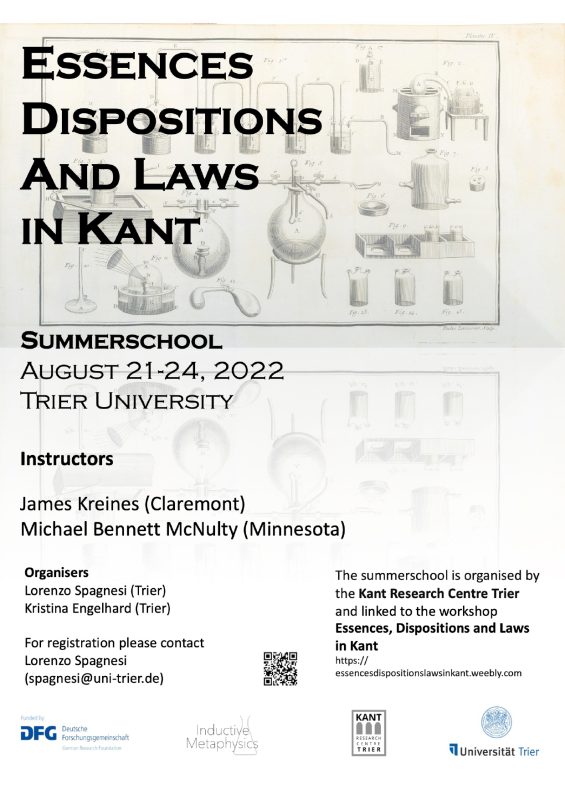We are glad to give notice of the Summer School (22nd-24th August 2022) and the Workshop (25th-26th August 2022) on Essences, Dispositions and Laws in Kant, organized by the First Kant Research Centre Trier. Both events will take place in person at Trier University (Universitätsring 15, 54296 Trier, B22 and A9/A10). There are no participation fees for the summer school and the workshop.
Below you find information about the Summer School as well as the Workshop.
***
Description.
After a long time of neglect, there has been a recent rediscovery of essences in the Kantian scholarship which seems to reflect the increased interest in essences in contemporary metaphysics (e.g., Armstrong 1983, Ellis 2001, Bird 2007). However, essentialist readings of the critical Kant’s philosophy of nature come in very different flavours: One prominent example is the influential ‘essentialist’ account of laws (e.g., Watkins 2005, Kreines 2008, Stang 2016). Minimally, this account argues that, for the Critical Kant, the necessity of laws is grounded in the essences or natures of things. A closely related account is that Kant can be interpreted as a precursor of ‘dispositional essentialism’ (Massimi 2017, Messina 2017) and a more distant view has it that the essences of the properties necessitating a certain behaviour are to be conceived as dispositional (Engelhard 2018). More generally, the rehabilitation of essences and dispositions in Kant’s metaphysics has important consequences for his general theory of modality and his theory of laws of nature.
Despite such rediscovery, several questions from both a metaphysical and epistemological point of view have not been fully answered so far. What are essences for Kant? Should they be distinguished from other key terms in his metaphysics, such as ‘natures’ or ‘grounds’? If essences ground the necessity of laws, what kind of necessity are they the source of? Should we think essences in dispositional terms, and if so, how exactly? Are essences beyond the possibility of knowledge or can they be object of some kind of cognition? What kind of investigation of nature do they afford? The aim of this summer school and conference is to shed light on these and other related questions, as well as to discuss the historical background of Kant’s views and to explore their implications for other areas of his Critical philosophy.
Summer School.
The summer school (August 22-24) aims at junior scholars, PhD students, as well as master’s students. It will be taught by two major experts in the field: James Kreines (Claremont McKenna College) and Michael Bennett McNulty (University of Minnesota).
Lecturers will introduce key primary and secondary texts and facilitate seminar discussion among participants (further details will follow soon). Seminars will be held each day of the summer school from 10am to 1pm and from 2pm to 5pm (six seminars in total). Participants are welcome to attend the workshop taking place immediately after the summer school. If you want to attend the summer school, please register by sending an email with your name, affiliation, and contact information to Lorenzo Spagnesi (spagnesi@uni-trier.de). The deadline for registration is June 15.
Workshop.
The workshop (August 25-26) will bring together international scholars who have worked on essences, dispositions, and laws in Kant from various perspectives as well as on the relation between Kant’s positions and contemporary views.
Confirmed speakers include: Hein van den Berg (Amsterdam), Angela Breitenbach (Cambridge), Andrew Cooper (Warwick), Kristina Engelhard (Trier), Stephen Howard (Leuven), James Kreines (Claremont McKenna), Michael Bennett McNulty (Minnesota), James Messina (Madison), Lorenzo Spagnesi (Trier), and Daniel Warren (Berkeley).
If you want to attend the workshop, please register by sending an email with your name, affiliation, and contact information to Lorenzo Spagnesi (spagnesi@uni-trier.de). The deadline for registration is June 15.
Call for abstracts.
We have three slots for participants’ talks during the summer school. If you are interested to give a talk, please send an anonymized 500-word abstract attached to your registration email. The talk must address the theme of the summer school. Please prepare your paper for delivery in 20 minutes (plus 10 minutes for the Q&A). The deadline for registration is June 15.
Funding.
Three fellowships (funded by the Deutsche Forschungsgemeinschaft) are available for the authors of the abstracts that will be selected for presentation during the summer school. Each fellowship amounts to 300 euros and can only be used to fund travel and accommodation costs. The deadline for registration is June 15.

